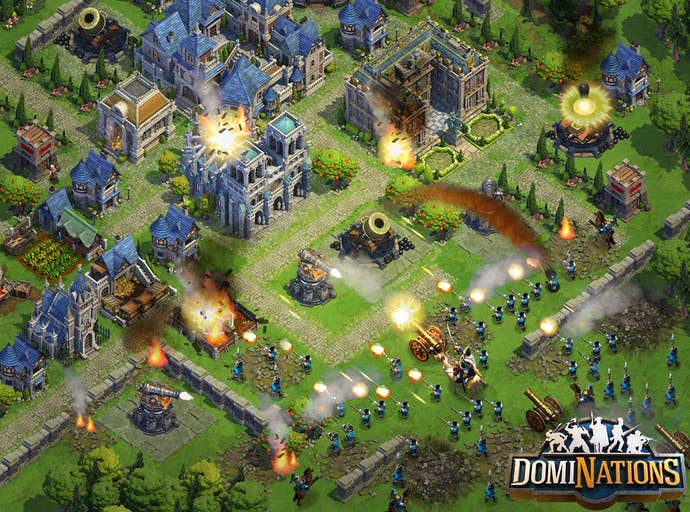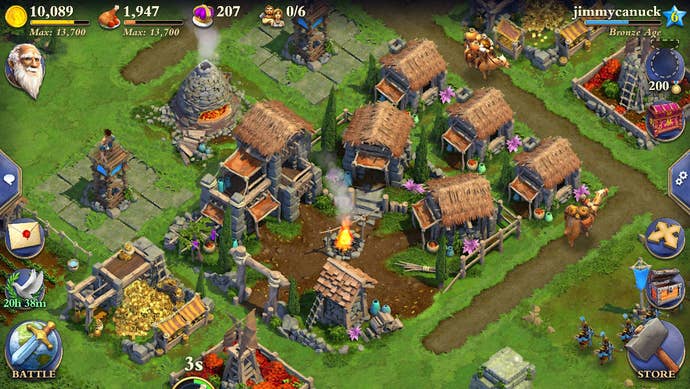"It's Kind of a Renaissance for Strategy Games." Five Insights into Mobile Strategy Games from Big Huge Games' Tim Train
How mobile strategy games can improve and other insights from the developer who has worked on Civilization, Rise of Nations, and more.
This article first appeared on USgamer, a partner publication of VG247. Some content, such as this article, has been migrated to VG247 for posterity after USgamer's closure - but it has not been edited or further vetted by the VG247 team.
Tim Train has been making strategy games for a long time now. The co-founder of Big Huge Games, which was really re-constituted following its demise during the 38 Studios debacle, Train counts Civilization and Rise of Nations among his credits. These days he's working in the mobile space, and he's a fierce proponent of its potential as a platform for strategy games.
His new game, DomiNations, builds on the concepts introduced by Clash of Clans by mixing in components from Civilization and other genre stalwarts, deepending the combat strategy while adding in familiar elements like Wonders. As a long-time strategy developer, he naturally has a unique perspective on the genre in general, and how it has grown in the mobile space in particular. Here are some of the insights he shared with me while showing me his game.
Making a mobile strategy game isn't that different from making something similar for the PC or console
Mobile strategy games tend to be seen as much less sophisticated than those on other platforms, but in working on DomiNations, Train says his team took much the same approach that they did with Rise of Nations.
"I'm always happy to have more depth in my games. There's a Sid Meier principal that depth arises from the interaction of simple systems. It doesn't have to mean complexity, necessarily, it just has to mean adding simple systems to your game."
"The funny thing is that the process of creation is not that different. We get it running as soon as possible, in the case of this game, it took about three weeks," Train says. "People were able to start tapping around the game and making things happen. Then we play every single game, we rip stuff out that's not fun, we try and put in stuff that might be fun, and there's a lather, rinse, repeat cycle that happens for two years. And at the end of that, you can't help but have a game that's fun to play if you've done stuff right, and you've prioritized prototyping. Other development methodologies prioritize design bibles, or big wall flowcharts, and we don't really do those things. That's exactly how we designed Rise of Nations and those kinds of games. Same design process as this has been."
He uses Wonders as an example, "Wonders of World are always fun, so we decided to put them in. From there it's about deciding how they work, what their powers are, and things like that, so we say, 'Alright, let's think of 10 different wonder powers.' Then only two of them might be any good, so we need eight new wonder powers. You do that enough, and finally you've got 10 compelling, fun wonders."
Mobile strategy games offer a greater variety of ways to spend your time
Train likes the flexibility offered by mobile strategy games. "They provide a play experience that fits in my day really well. Games that require me to sit down for two hours and I have to sit down with my Xbox, update my Xbox, insert a disc, and update the game, and it's 20 minutes before I can play my game. And then it requires that 2 hour commitment to have a satisfying experience, which is cool, but 2 hour chunks of my life have become increasingly dear to me as I've gotten older. Whereas the mobile strategy experience is a lot more customizable."
He continues, "I might go days where all I do is hunt animals, see what kind of rare drops I get, and purchase blessings to make my city temporarily stronger. Then, when I'm really in the mood, I can make a run for the cannon upgrade, which might cost me 3.2 million food, at which point I'll sit down for 2 hours, raid people off, and try to really optimize that experience. So to me, that's what they do. There are games that I can choose how much I want to engage with as opposed to committing to a 2-hour block of time."

But there's still more that mobile strategy developers can learn from Sid Meier's approach to design
"I'm always happy to have more depth in my games. There's a Sid Meier principal that depth arises from the interaction of simple systems. It doesn't have to mean complexity, necessarily, it just has to mean adding new simple systems to your game. So the hunt and gathering is a simple system. You click on the animal, you hunt it, and it gives you a rare resource or a drop, which then plugs into another system, which is mercenaries," Train says.
"Mercenaries are powerful, cool units, I can buy them with rare resources, and they're really simply to understand. Those two systems are independently really simple, but then together they start to become, 'I don't have the diamond for the cool War Elephant, so I've got to go farm the diamond.' It just adds these layers to the game, and I think in mobile strategy games there's a lot of room to run in there. The combat can have more of those systems. The base-building can have more of those systems. I think that another really cool component of these games is the social aspect. I really like being able to play with my alliance, and donate my troops, and be the one who always donates the cannon. I think there's a lot of room for improving the social experience."
Old-school strategy developers fit well into the free-to-play space
Many veteran developers have moved into mobile over the past few years, and strategy developers are particularly well-suited for the space, Train says. "I think that systemic thinking is the part that translates the best into the mobile world. And I don't think it's any accident that some of the best free-to-play designers are old-school strategy developers, whether it's Mark Skaggs or Brian Reynolds, people who worked on Command & Conquer, or Age of Empires, or Rise of Nations in our case," he explains. "And I think that kind of systemic thinking is really tailored to this kind of mobile world in a way that's a little different than games that are content driven, like an RPG or something like that. I'm not sure that skillset translates quite as well."

Mobile strategy is part of a new renaissance for the genre.
"I'm pretty excited where they are now, and we're kind of the second generation. The first generation would be Clash of Clans, Samurai Siege, and games like that. Sort of the granddaddys, if you will. To me, the trend lines on those are really good. Clash was fun, I really enjoyed Boom Beach, which had more of a skill-based component. I really like DomiNation, which I'm obviously biased, but I've been playing it basically non-stop for a year now," Train says.
In categorizing his own as a "second generation" mobile strategy game, Train says he feels they've made great strides with the asynchronous combat. "A lot of other games, you might put down your whole army and let them go. With our game, you can use the rally command every 30 or 40 seconds, more depth in the kinds of armies you build where a Siege Army is really good at blasting away buildings but is weak, slow, and has to be protected. So now instead of setting down a whole army, you might put your siege units down, but here comes his cavalry, so you have to put in a bunch of heavy infantry, which I think lends itself to a really compelling combat experience that totally builds on the first-generation of mobile strategy."
Surveying the overall landscape, Train says he's pleased by the variety of games that are now available. He believes studios like Firaxis can co-exist with Clash of Clans developer Supercell, and in the process cater to many different tastes. "It's kind of a renaissance for strategy games, they're just different from what people are used to with the hardcore, old-school RTS and turn-based games. I love that there are 100 million people who can play these games and get educated on what a strategy game even is. I feel like the genre is evolving, I enjoy being part of that evolution, and I'm hopeful that it will continue to evolve for 5, 10, 15 years, and we'll see where it all goes."


